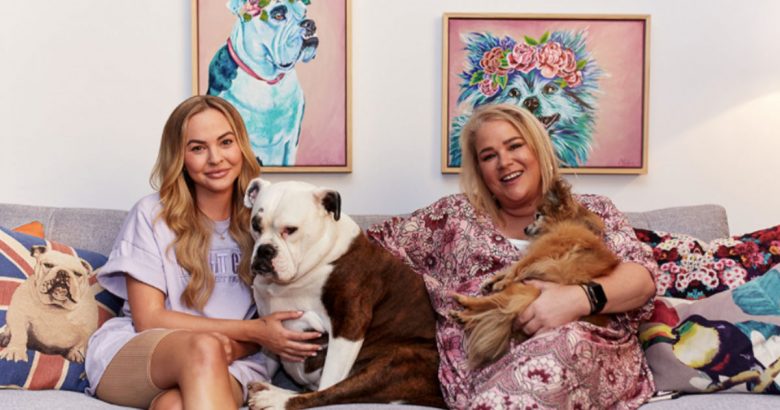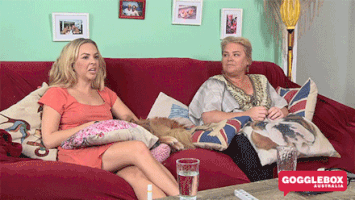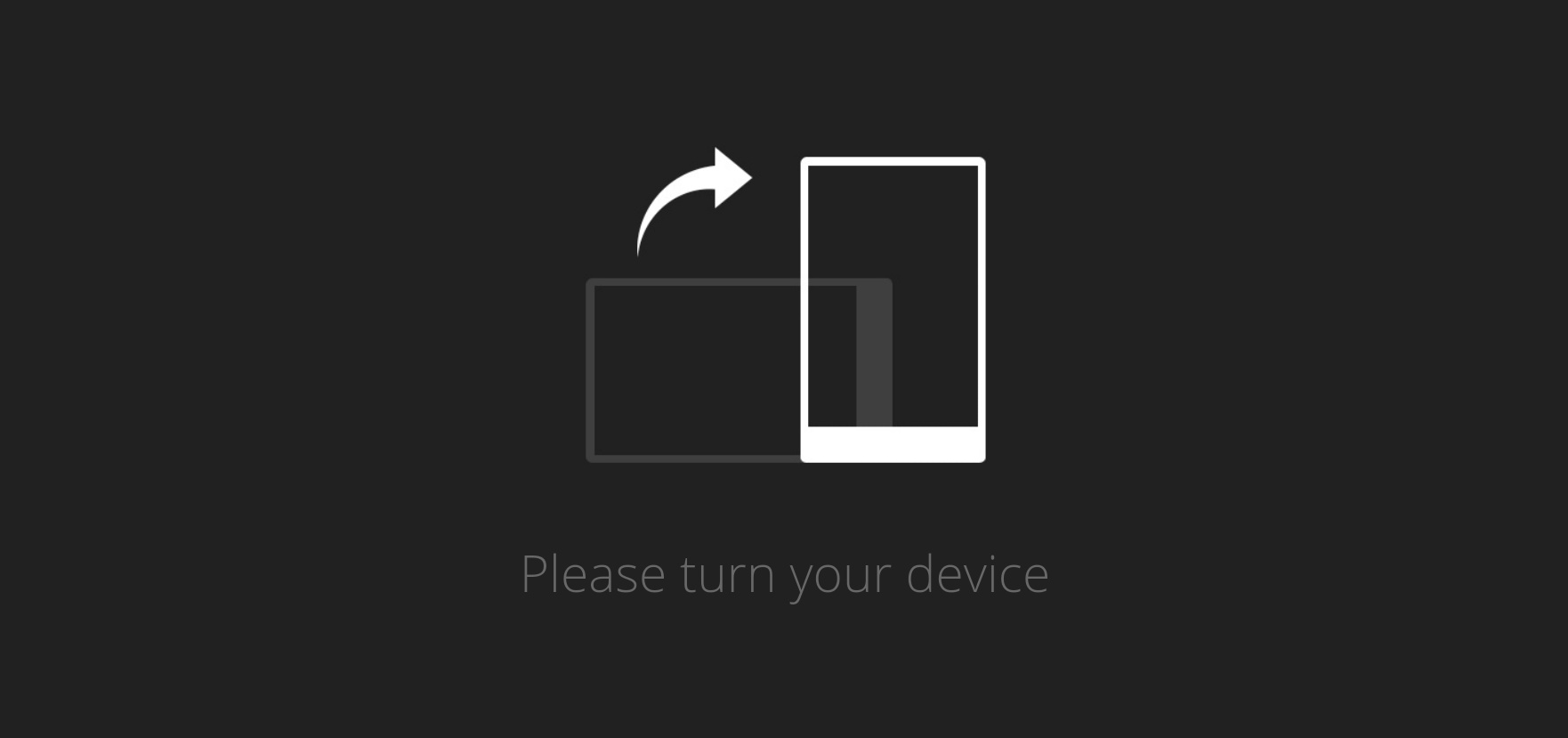
Angie & Yvie Spill The 5 Things They’ve Learned About Reality TV
Before Angie Kent was our Bachelorette, and before Yvie Jones was gracing us with her presence on Studio 10, the BFFS were two of our favourite Goggleboxers.
From commentating on TV shows on Gogglebox, to starring on I’m A Celebrity… Get Me Out Here! Angie and Yvie have been a wholesome fixture on our TV screens for years now and their friendship is absolute goals.
View this post on Instagram
Let’s just say, after their own TV experiences the two have learned a little about what it’s like to be a fan and a star of reality TV shows.
Angie and Yvie have joined forces for a new campaign with Fantastic Furniture, which sees them catching up back on the couch where it all began to dish us some of the tea surrounding reality TV.
Here are five life lessons Angie Kent and Yvie Jones learned after becoming reality TV stars themselves.

1. Don’t believe everything you see.
Yvie: “I was aware that television had lots of editing but had never heard of the term ‘frank n grab’ until we were the ones being edited.
A ‘frank n grab’ is when TV producers take a person’s words and reposition them in a narrated sentence. They edit what is said to effectively ‘put words in your mouth’ – sometimes to make things more interesting, other times to make characters look like heroes or villains.”
Angie: “When you go on reality TV, you do consent to this under your contract, but as a viewer, just remember everything isn’t always what it seems! If you don’t see a person saying a word, but their voice is saying it, it could be because a ‘frank n grab’ is at play!
If you listen closely, you can often tell that this is happening because the person’s tone or the pacing of their sentence sounds a bit off. The devil is in the details… I used to hate hearing myself when it would happen to me. I’d say some really weird shit sometimes, without actually ever saying it!”
2. Being on reality TV does not make you rich!
Yvie: “If only it did! The ‘reality’ (excuse the pun!) is that there is not a lot of money to be made solely by appearing on reality TV. The money comes from product endorsements, brand partnerships and parlaying into other projects once the show airs. This can be tricky, especially if you want to stay true to yourself. I am not big on endorsing products, brands or services that I don’t love, so I’ve learnt to say ‘no’ when it doesn’t feel right. The flip side is that I’m not rolling in it!”
3. There is a lot that never makes it to air.
Yvie: “I used to think when I watched reality shows that they showed mostly everything – or at least the best bits. I was wrong! It makes sense when you think about it; many of our favorite reality shows are filmed over hours, days, weeks and months – and, as a viewer, we usually get one or two episodes per week.”
Angie: “Yes! There is so much that gets left on the cutting room floor. Don’t think that everything you see is ‘bible’ and exactly what happened. It used to really upset me to see all the hours, blood, sweat and tears that I’d put into filming dwindled down to a tiny edit (or get cut altogether), but over time I’ve learnt to detach myself more and try to just enjoy the final product for what it is. At the end of the day, it’s just a TV show.”
Yvie: “And what gets cut doesn’t always come down to what parts are the most interesting. So many other factors determine what the editors choose to include or exclude – from who they think will draw ratings, through to the character and narrative arcs they want to tell and, of course, which characters stick around (and are therefore worth giving any airtime to).”
Angie: “You can see from the different edits that one reality TV character can receive from one season/show to another just how favourable or unfavourable editing can be – and just how easy it can be to include or exclude footage what can make or break a person’s character. That’s why it’s always important to read between the lines.”
4. Reality TV stars are people, not just characters.
Yvie: “It is incredibly easy to be mean about someone when you look at them just as a character on your TV screen. I know this all too well, as we admittedly used to say some regrettable things about TV personalities when we were on a not-to-be-named TV show (Wink!). Note: of course, all of the crappy things we said were usually included vs all of the lovely things, but I’ll save those stories for another day!
Of course, I can still be mean when watching reality TV and that’s arguably part of the genre’s appeal. But I only truly dislike a TV personality if they say or do something that’s strongly opposed to what I stand for. And even then, I probably wouldn’t invest too much energy because I don’t actually know the person and I understand that nothing said or done on reality TV exists in a vacuum.”
Angie: “For sure, we are all entitled to our own opinions, but before you hit someone up in their DMs with abuse or troll them on Twitter, remember they are a real person – with real feelings, flaws, families, and friends. You don’t ‘really’ know them, and you certainly don’t know what they’ve been through or what they may be dealing with today. Feel free to express your opinion if you feel it’s necessary or constructive, but always keep it respectful and above the belt.
Always try to be kind. You don’t know what someone might have been through for your entertainment. To them, something you’re seeing on TV may have felt like ‘real life’ in that moment, so laugh away with your friends or in private, but think twice before rubbing salt in their wounds by humiliating them or sending negativity their way. Put ya pitchforks down and enjoy the ride!”
5. Every TV show is highly produced – even the least produced ones.
Angie: “Every TV show has one or more producers – and if you’re appearing on a reality show, you’d be wise to remember that. As much as producers can be great people and seem like your best friends in the entire world (especially when you’re isolated and stripped from your vices in a filming bubble), they have a job to do – that is, to create addictive, compelling TV.
They are being ‘paid’ to be your best friend, and they’re also being ‘paid’ to produce behaviour, reactions, and emotions from you. Let them guide you in directions you’re generally comfortable going (you did sign up for a show after all!), but always trust your gut. If your alarm bells are ringing, it’s probably for good reason…”

Yvie: “It is worth understanding this as a viewer as well. Remember that a lot of what you’re seeing on reality TV is orchestrated by producers. This often makes for great TV (I can only imagine how boring most reality TV shows would be without producers), but it’s also the reason that you can’t take most things said or done on these shows too seriously. Love it for what it is, just know what it is.”
